The final of the 2024/2025 Faculty of Natural Sciences Make-A-Difference competition takes place on Wednesday 22 October 2025. Ahead of this, we hear from the finalists about their projects.
“We knew it would happen again.” That was the certainty Arda Kancal and his teammates brought with them from Istanbul, Turkey. The 2023 earthquake that devastated their country was not the first, and, according to seismologists, almost certainly not the last. With a 60% chance of a similarly catastrophic quake hitting Istanbul by 2030, the team behind D-View entered Imperial College London’s Faculty of Natural Sciences Make-A-Difference (FoNS-MAD) competition determined to build something life-saving.
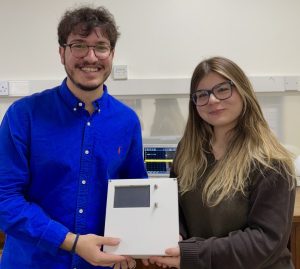
Their project, an autonomous drone system that uses low-cost geophone sensors to locate trapped earthquake survivors, was born not only out of a sense of academic curiosity but also necessity. “We watched as people in our hometowns waited for rescue that never came,” Arda said. “We knew we had to do something. Something cheap enough for governments to actually use, something deployable, not just theoretical.”
Now in its eleventh year, FoNS-MAD is Imperial’s only undergraduate innovation competition focused on building real, deployable tech with a social impact. It invites undergraduates across the Faculty of Natural Sciences – and team members from other faculties – to prototype low-cost technologies that can change lives.
Each year, a select group of finalists are awarded funding, lab space and a bursary to work full-time over the summer to turn their idea into reality. At the end, they pitch their working proof-of-concept to an expert panel, competing for up to £7,000 in prize money.
“This year, the quality of the proposals we have seen from our teams has been outstanding. We have selected an unprecedented six teams to take through to the final stage of the competition, which is testament to our students’ innovation skills, creativity and teamwork,” said Rebecca Middleton, Director of Education and Student Experience in the Faculty, who has managed the competition since 2014.
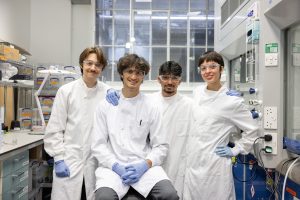
Many of the ideas have developed far beyond the lab. Just ask Multus Biotechnology. In 2020, a group of students from the Departments of Life Sciences and Bioengineering entered FoNS-MAD wanting to answer a deceptively simple question: if cultivated meat has such clear benefits for the planet and for animals, why isn’t it in supermarkets yet?
Their answer? The growth media used to culture animal cells was too expensive, too inconsistent, and often derived from animals. So, they built an alternative: Proliferum M, a plant-based growth medium that was cheaper, scalable and animal-free. From their FoNS-MAD project, they launched a company which has raised £7.9 million in funding, received a prestigious European Innovation Council Accelerator grant, and begun building a manufacturing facility for the cultivated meat industry.
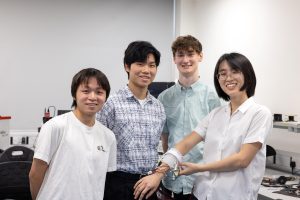
This year’s competition finalists have proven to be no less ambitious. Sacchrosense will be rapidly creating a prototype of a cheap, at-home diagnostic test built using engineered yeast. When a virus like flu or RSV is detected, the yeast reacts and changes colour, enabling users to visually identify an infection without needing to visit a GP or – goodness forbid – self-diagnose using WebMD.
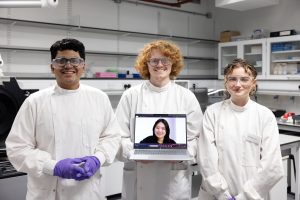
Meanwhile FlyeWheel aim to restore tactile sensation to prosthetic users, integrating fingertip sensors with a soft robotic armband that inflates to simulate pressure on the wearer’s arm. Inspired by team member Edwin Ko’s volunteer work with people living with disabilities, their modular system is designed to retrofit existing prosthetics without requiring invasive surgery or costly electronics.
Flyewheel and Sacchrosense are not the only students concerned about democraticising health devices. Students are also aiming to develop sleek, skin-friendly ‘brain sticker’ or ‘Advanced Neural Adhesive’ (ANA) that delivers real-time mental health insights to your phone. This wearable neural patch will passively measure EEG brain activity, allowing neurodiverse users to understand and predict their stress and focus levels in real-time.
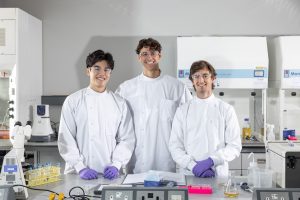
Another team, LaminaBio, is revisiting an enzyme engineering idea that fell just short during a second-year project, attempting to turn algal waste into a sustainable glucose source for biomanufacturing. Their work could eventually reduce reliance on land-grown sugar crops in industrial fermentation, a shift with major climate implications.
Finally, Sense++ is tackling inclusivity head-on. Their device aims to convert on-screen content – text, images, even video interfaces – into Braille, creating a low-cost, interactive solution for visually impaired users priced well below existing market options like Dot Pad.
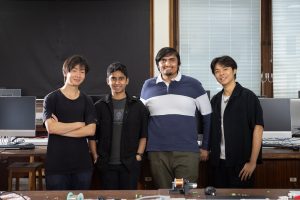
“The FoNS-MAD competition goes from strength to strength and there are some outstanding proposals from this year’s cohort. It’s inspiring to see so many students engaging in projects that can make a real difference to the world,” said Professor Ramon Vilar, Co-Chair of the FoNS-MAD Committee alongside Dr Thibault Bertrand.
FoNS-MAD, now a staple of the undergraduate innovation calendar at Imperial, continues to offer something rare in higher education: the chance to build something that not only works in theory, but might actually work in the world.
“I’m really looking forward to seeing how all of our teams progress through their summer lab placement and I am expecting the final event in October to be really exciting and very competitive,” Rebecca said.
The final competition pitches take place later this autumn, but for the winning team, the prize money will just be the beginning.
Register to attend the Faculty of Natural Sciences Make-A-Difference (FoNS-MAD) Competition Final 2025, taking place 16.00 – 20.00 on Wednesday 22 October at G16 Lecture Theatre and Lower Foyer, Sir Alexander Fleming Building, South Kensington Campus. Register now.
This article first appeared in the Faculty of Natural Sciences Faculty Magazine 2025.